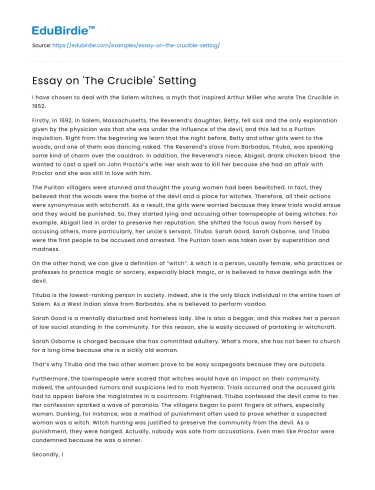I have chosen to deal with the Salem witches, a myth that inspired Arthur Miller who wrote The Crucible in 1952.
Firstly, in 1692, in Salem, Massachusetts, the Reverend’s daughter, Betty, fell sick and the only explanation given by the physician was that she was under the influence of the devil, and this led to a Puritan inquisition. Right from the beginning we learn that the night before, Betty and other girls went to the woods, and one of them was dancing naked. The Reverend’s slave from Barbados, Tituba, was speaking some kind of charm over the cauldron. In addition, the Reverend’s niece, Abigail, drank chicken blood. She wanted to cast a spell on John Proctor’s wife. Her wish was to kill her because she had an affair with Proctor and she was still in love with him.
Save your time!
We can take care of your essay
- Proper editing and formatting
- Free revision, title page, and bibliography
- Flexible prices and money-back guarantee
The Puritan villagers were stunned and thought the young women had been bewitched. In fact, they believed that the woods were the home of the devil and a place for witches. Therefore, all their actions were synonymous with witchcraft. As a result, the girls were worried because they knew trials would ensue and they would be punished. So, they started lying and accusing other townspeople of being witches. For example, Abigail lied in order to preserve her reputation. She shifted the focus away from herself by accusing others, more particularly, her uncle’s servant, Tituba. Sarah Good, Sarah Osborne, and Tituba were the first people to be accused and arrested. The Puritan town was taken over by superstition and madness.
On the other hand, we can give a definition of “witch”. A witch is a person, usually female, who practices or professes to practice magic or sorcery, especially black magic, or is believed to have dealings with the devil.
Tituba is the lowest-ranking person in society. Indeed, she is the only black individual in the entire town of Salem. As a West Indian slave from Barbados, she is believed to perform voodoo.
Sarah Good is a mentally disturbed and homeless lady. She is also a beggar, and this makes her a person of low social standing in the community. For this reason, she is easily accused of partaking in witchcraft.
Sarah Osborne is charged because she has committed adultery. What’s more, she has not been to church for a long time because she is a sickly old woman.
That’s why Tituba and the two other women prove to be easy scapegoats because they are outcasts.
Furthermore, the townspeople were scared that witches would have an impact on their community. Indeed, the unfounded rumors and suspicions led to mob hysteria. Trials occurred and the accused girls had to appear before the magistrates in a courtroom. Frightened, Tituba confessed the devil came to her. Her confession sparked a wave of paranoia. The villagers began to point fingers at others, especially women. Dunking, for instance, was a method of punishment often used to prove whether a suspected woman was a witch. Witch hunting was justified to preserve the community from the devil. As a punishment, they were hanged. Actually, nobody was safe from accusations. Even men like Proctor were condemned because he was a sinner.
Secondly, let’s give the definition of a myth. According to the Cambridge Dictionary, a myth is a traditional story, especially one that explains the early history or a cultural belief or practice of a group of people or explains a natural event. We can add that a myth is a story that people tell but that is not necessarily true. We usually think that witches were burnt alive but in fact, they were hanged.
To conclude, we can say that the figure of the witch is mythical because it shows that in any community during a period of crisis, people tend to find a scapegoat, a person who is the most vulnerable.
When we speak about witch hunting we usually refer to the persecution of people, usually chosen as scapegoats. It can also be synonymous with a systematic campaign directed against political opponents with unpopular views or against any person who holds different views. Actually, it illustrates the fear of people at a certain time.
By setting the Crucible in 17th-century Salem, Miller wanted to show that history was repeating itself. The settings were different but the objectives were the same: to blacklist and get rid of people who were believed to be dangerous. The witches of the 17th century were replaced by the Communists of the 1950s McCarthyist America. In both cases, the witch hunt and the Red Scare were triggered by paranoia. People were not considered innocent when they were accused. It was a travesty of justice. Miller saw an analogy between the two eras in the fight against the enemies of the USA.
To finish, The Crucible is a political allegory of the hysteria of the Red Scare, and Miller, considered as a Communist sympathizer, shows how unfounded rumors and suspicions can erode the foundations of society.






 Stuck on your essay?
Stuck on your essay?

